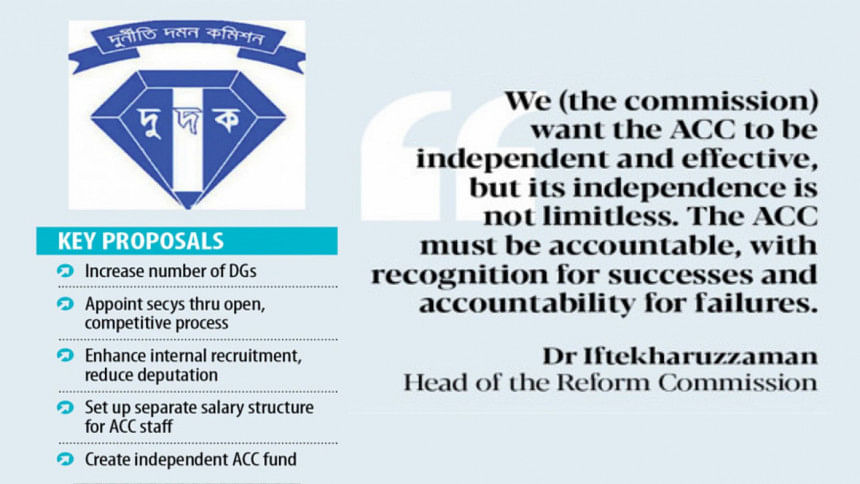Cut bureaucracy, boost autonomy

The Anti-Corruption Commission Reform Commission has recommended comprehensive changes to reduce bureaucratic influence and strengthen the ACC's autonomy.
In a report submitted to Chief Adviser Prof Muhammad Yunus on Wednesday, the commission proposed 47 recommendations focusing on institutional, financial, and operational reforms to enhance the ACC's effectiveness and independence.
The recommendations are divided into three categories. In the institutional and financial management category, the report stressed relying on the ACC's own human resources.
INSTITUTIONAL, FINANCIAL MANAGEMENT
It recommended increasing the number of directors-general from 8 to 12, while dividing their responsibilities into sub-divisions -- Administration, Finance and HR, Prevention and Public Relations, IT, Training, Research and Development, Legal and Prosecution, Investigation, Special Investigation, Secret Investigation, Money Laundering, and Internal Discipline.
The reform commission also recommended introducing competitive, open processes for appointing secretaries through advertisements, allowing government employees to apply on a contractual basis, subject to getting leave from their original organisations.
Similarly, for DG and director positions, except for those appointed through deputation, the commission has recommended competitive and open processes.
However, the commission suggested reserving 60 percent of DG posts and 75 percent of director posts for internal candidates, provided they meet eligibility criteria.
It proposed to fill a maximum of 10 percent of positions through deputation at each level. But deputation for judicial or law enforcement roles will not count toward this limit.
The commission advised abolishing Rule 54(2) of the ACC (Employee) Service Regulations, 2008 -- which allows dismissing employees with a 90-day notice and salary but without any justification -- to ensure independence and security for ACC employees.
It also recommended establishing a separate salary structure for the ACC, with salaries at least double the national structure, along with risk allowances for officials involved in investigations, secret inquiries, and related tasks.
The commission suggested creating the ACC's own fund, sourced from the government-approved annual budget and 10 percent of fines or confiscated assets collected through ACC cases.
It also suggested introducing annual salary increments and performance bonuses for officials and employees from the ACC's own fund, under specific policies.
OPERATIONAL REFORMS
The reform commission has advised immediately forming a permanent prosecution unit as per the ACC Act by appointing a few permanent prosecutors initially, and gradually replacing contract-based lawyers with permanent prosecutors over 5-10 years.
It also asked to automate the ACC's processes, including case management, investigations, secret inquiries, and prosecution through end-to-end automation. It also suggested expanding the Digital Forensic Lab's manpower and capacity and placing it directly under the chairman's supervision.
The commission also proposed setting up an ACC training academy to enhance its financial, administrative, and technical capabilities and to ensure mandatory and regular staff training.
To prevent internal corruption, the commission has advised forming a high-powered task force, with support from government and intelligence agencies, to identify and expel corrupt ACC officials and refer them for criminal prosecution.
ACC spokesperson and Director-General Md Akhtar Hossain declined to make any comments on the report.
Dr Iftekharuzzaman, head of the reform commission, said, "There should be diversity in ACC appointments. ACC should recruit from professions directly related to its work instead of prioritising bureaucrats."
"We (the commission) want the ACC to be independent and effective, but its independence is not limitless. The ACC must be accountable, with recognition for successes and accountability for failures," he added.

 For all latest news, follow The Daily Star's Google News channel.
For all latest news, follow The Daily Star's Google News channel. 










Comments